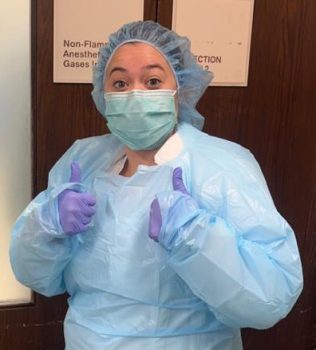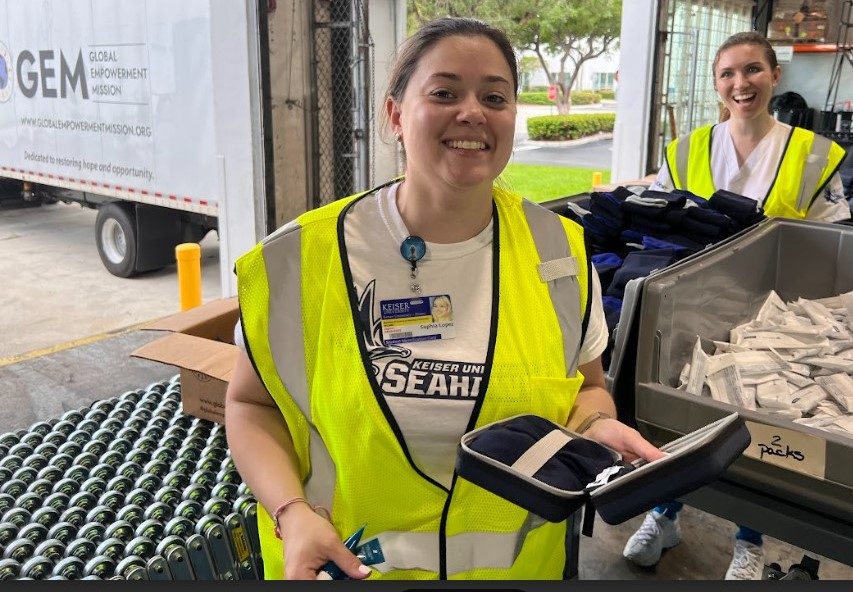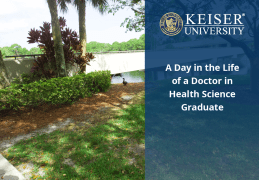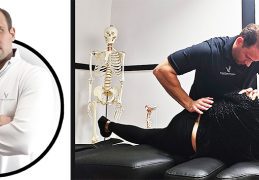Her father was a pharmacist, her mother a nurse. Chances are Sophia Lopez would follow in the path of her parents and pursue a career in healthcare as well. Or so it seemed.
“I’ve always wanted to be a nurse,” said, Lopez, who spent the first 10 years of her working career in a secretarial role at Baptist Children’s Hospital in Miami, offering to do this or that for the nurses on staff. “I was always asking what could I do to help? ‘Can I get you wipes?’ I just needed to help.”
These days, Lopez is helping herself. The single mother of two boys is about to embark on another leg in her journey to become a nurse when fall semester classes at Keiser University begin next week on the Miami campus. If all goes as planned, Lopez will graduate in December with a Bachelor of Science degree in Nursing.

Maybe then she can exhale and reflect on what it was like to juggle the responsibilities of being a full-time student, mother, and hospital employee.
“I’d like to sleep-in every day, but I know that’s not an option,” said Lopez, who, in addition to her coursework at Keiser, serves as a radiologic technologist at Baptist Children’s Hospital where she works two, 12-hour shifts on the weekend. “I love the medical field because I love helping people. This is what I want to do, and I am on the right path.”
For single mothers like Lopez, balancing college, work, and childcare is an immense chore. Consider: prior to the pandemic, just 28 percent of students who are single mothers earned a degree or credential within six years. COVID-19 only exacerbated the challenges they face.
Giving Back
Lopez learned firsthand after enrolling at Keiser University, where she went on to earn an Associate in Radiology degree. The 32-year-old Doral resident did not expect her current pursuit of an undergraduate nursing degree to be any less difficult. From Monday through Friday, she is either in class, in clinicals or volunteering.
“I like to give back to the community,” said Lopez, who has offered her time at the University of Miami’s Linda Ray Intervention Center, where she provided “another set of hands” for staff in support of children and youth with complex medical, emotional, or behavioral problems.
This month, Lopez joined at group of Keiser nursing students who volunteered at the Global Empowerment Mission, a nonprofit in Doral that provides disaster relief. She and her Keiser classmates dedicated their time to sort through incoming donations and assemble hygiene kits for people in crisis, such as the victims of the recent devastating Maui wildfires.
“It’s what being a nurse is all about,” said Lopez, a source of inspiration along the family tree for her brother, Ricardo, who is also in the Keiser nursing program. “We have to be ready to be wherever for whatever.”
Which does not leave much free time. Just a moment to cook a Cuban meal for her family, study for an exam, catch a glimpse of a television show, or tackle laundry. Then it is off to take her boys to a sports activity.
“I know this is just temporary,” said Lopez, whose goal is to eventually be a nurse practitioner. “I want to be able to heal patients. This is when I will be happiest.”
Addressing Shortages
Healthcare administrators, educators and policymakers are pinning their hopes on qualified graduates like Lopez to address a serious nursing shortage across the United States. The Florida Hospital Association predicts a shortage of 60,000 nurses in the state by 2035.
Recognizing the urgency and its responsibility to grow Florida’s nursing workforce, Keiser University joined forces with community partners across the state to establish a Nursing Advisory Council that will develop short- and long-term solutions to help solve the crisis.
Keiser University has become one of Florida’s largest producers of nurses, graduating more than 3,200 since 2017, and a leader in producing allied health graduates that make up the backbone of Florida’s healthcare system.
“As Florida’s population continues to grow, the state’s future economic success is intertwined with a vibrant, financially strong, and sophisticated healthcare system,” said Belinda Keiser, vice chancellor of Keiser University. “That future includes a strong nursing workforce and Keiser University, along with our partners, is committed to meeting the nursing and healthcare workforce needs of the Florida.”
Choosing a Nursing Program
Graduates in the Keiser University Bachelor of Science Nursing program are prepared to provide compassionate, patient-centered, culturally competent nursing care to individuals, families, groups, communities and populations in a variety of settings, using evidence-based knowledge and skills related to wellness, health promotion, illness, disease management, and end-of-life care to improve healthcare outcomes. They will practice in partnership with patients as members and leaders of the interprofessional healthcare teams, utilizing the most current healthcare technologies. Successful completion of this program qualifies graduates to sit for the NCLEX-RN licensing exam.
Keiser University is a private, independent, non-profit university serving 20,000 students at 21 Florida campuses, online, and two international sites. Co-founded in 1977 by Chancellor Arthur Keiser, Ph.D., and Evelyn Keiser, Keiser University currently offers more than 100 degrees from associate to the doctoral level. Keiser University is a designated Hispanic-Serving Institution, a member of the Hispanic Association of Colleges and Universities, and was ranked No. 1 in the U.S. in providing Social Mobility by U.S. News and World Report in 2023.






 The instructors at Keiser University impacted my life. They believed in my ability to become a great graphic designer, regardless of how I felt about my skills. KU helped to prepare me for the real world and got me to where I am today.
The instructors at Keiser University impacted my life. They believed in my ability to become a great graphic designer, regardless of how I felt about my skills. KU helped to prepare me for the real world and got me to where I am today.
